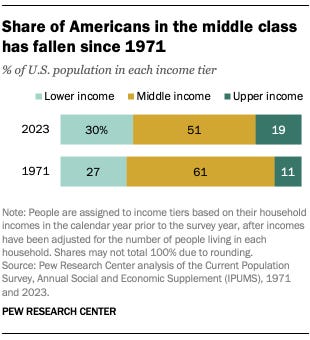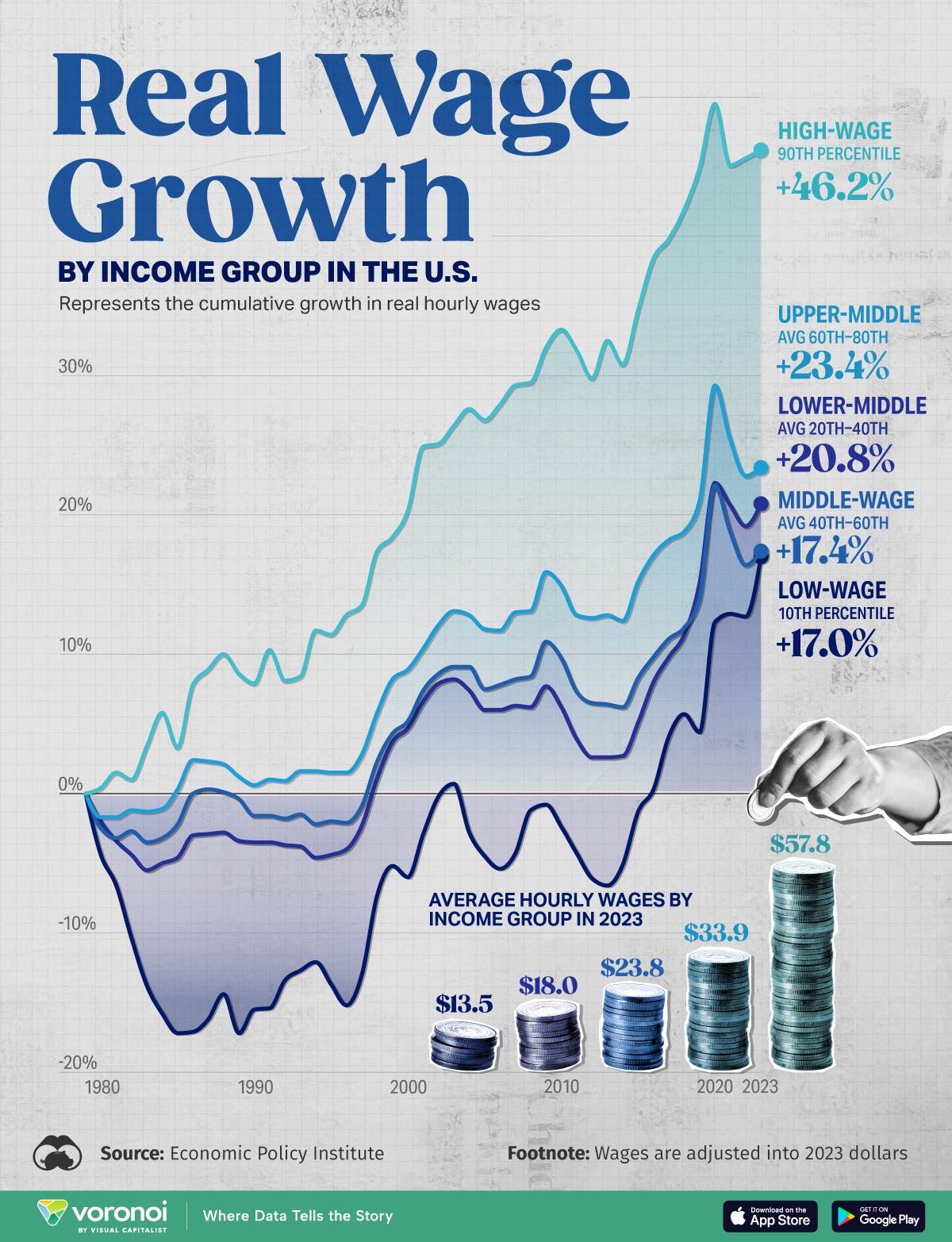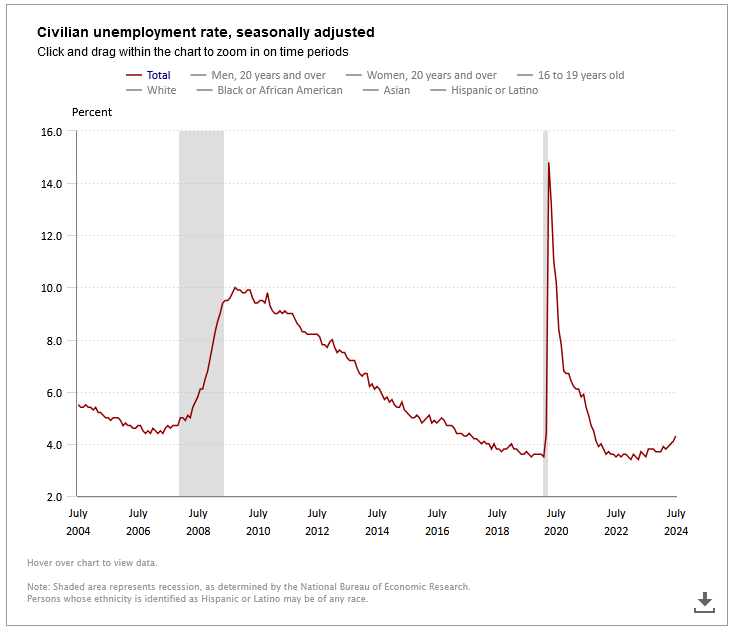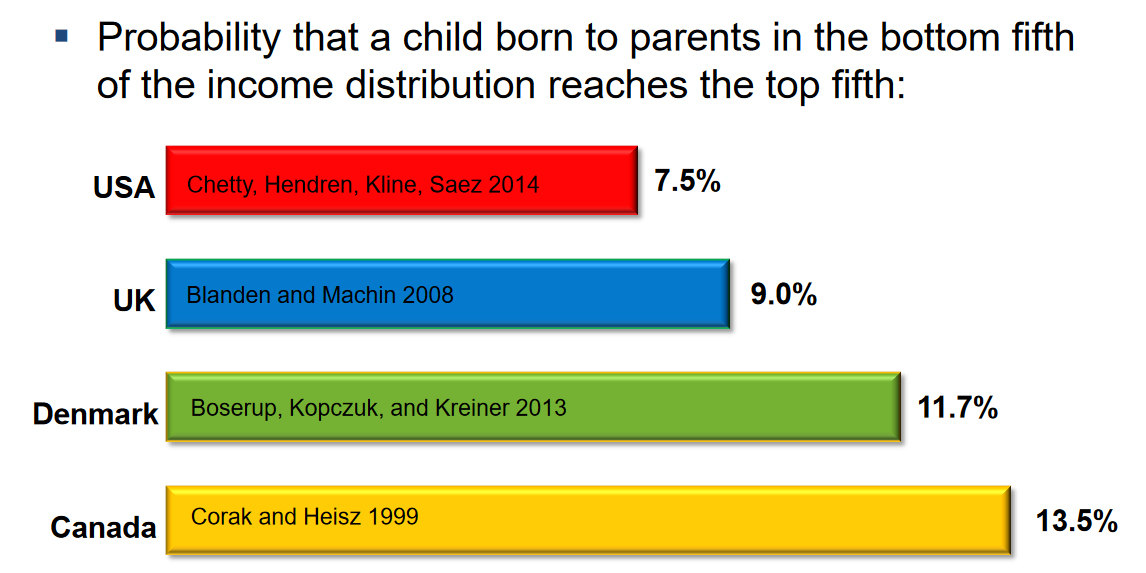How I Moved Left On Economics
Trickle down theory wasn't great
I grew up in a conservative household and was brought up with conservative economic beliefs, though my parents were not as conservative on social issues. At that time it seemed like conservatives tended to have more realistic economic principles. The invisible hand was established economic theory, while liberals seemed to care more about economic injustice than about evidence and policies proven to work in the real world. I was young and hadn’t experienced much of the world back then, but also there was less information available to regular voters (plus, we tend to fight yesterday’s battles). I haven’t become a socialist or anything (I won’t be voting for Bernie any time soon) but I now see the holes in conservative economic theory that I couldn’t before. Interestingly, the GOP seems to understand that they had it wrong but they don’t actually have a way to set it right. Ultimately the party is still pushing for tax cuts as the end-all-be-all solution to every problem, even though taxes are at a historic low. The more populist turn of the Trump era seems to have only caused them to abandon fiscal responsibility (which is too bad because this would be a great time to bring that back) and be more quiet about slashing Social Security and Medicare. The GOP feels kind of lost in the wilderness right now on economics, still trying to channel Reagan’s ideals of low taxes and less regulation, but while adopting left-wing anti-corporate jargon and trying to come to terms with Trumps disdain for free trade. Meanwhile, the center-left is a great place for pragmatic economic ideas and discussion that deals with the complex realities of the world we live in. Let’s talk about some of those.
The hollowing of the middle class
These days you get a lot of doom and gloom on the internet about how terrible the economy is for “real people”. Most of this hand wringing is imaginary, life has always been pretty difficult for the average person. In 1900 the median family spent 80% of their income on food, housing, and clothing. In 1950 the median family spent around 26% of their income on housing, vs somewhere around 31% today. That isn’t ideal but at the same time the size of the average house has grown from 983 square feet to over 2,600 square feet today. And the amount we spend on food has decreased from 29% in 1950 to around 11% today, so it looks like we just took that money we don’t have to spend on food and spent a little bit of it to nearly triple our house sizes (with smaller families living in them) and still had around 13% more to spend on frivolities. If you judge purely by economic measures, there’s no better time to be an American than today.
That being said, it is absolutely true that the middle class has been “hollowed out”, but in a somewhat complex way.
As you can see, the middle class has shrunk from 61% in 1971 to 51% today. But while 3% of them got poorer, 8% got richer. That doesn’t sound too bad! But it does seem to undermine the idea that a rising tide lifts all boats. The modern economy has been great for most people, but some people are getting left behind. Here’s another way of seeing how things have changed since 1980:
It’s important to note that this chart already takes inflation into account, which is why you see wages fall for most income groups in the 80’s even though the absolute wage level at this time was steady. So even low income people in this country have gotten richer, but that only started being true after recovering from the great recession. The pandemic-induced worker shortage of the last several years has fueled major inflation but it’s also been an enormous boon for low income workers.
Is it fair to blame conservatives for all of that? I think so, yes. From 1970 to 2007, Republicans held the presidency 7 out of 10 times. President’s don’t run the economy, but that statistic is one way of showing how dominant conservative ideas were in that era. Democrats mostly abandoned the economic populism of the 1960s and moved closer to Republicans on economic issues. It was the only way to stay relevant. Reaganomics was the name of the game. Democrats moderated on social welfare, retreated from supporting labor unions, failed to raise the minimum wage laws to keep up with inflation, and joined with Republicans on issues of free trade. It didn’t go terribly wrong, 8% of people moved into higher income brackets! But I don’t think most Americans would look at those numbers in totality and say this is what an ideal economy looks like.
Tax cuts don’t create jobs
When congress passed the Tax Cuts and Jobs Act in 2017 it was touted as a bill that would create tons of jobs, hence the “Jobs” part of the name. Trickle Down Economics had already become a dirty word so they didn’t call it that, but it functioned on the same principle. If we cut taxes for businesses, those businesses will use the money to hire more workers. It’s not a crazy idea, but fails to account for some pretty basic cause/effect relationships in an economy. If supply is having a hard time keeping up with demand and companies want to grow but are strapped for cash, then a tax cut would help with the necessary funds to grow the business, including hiring more workers. 2017 was not one of those times. Businesses had been doing great for years, and unemployment was already very low. The Tax Cuts and Jobs Act predictably did nothing for jobs. The labor force participation was about 62% before the act was passed. It was about 62% after the act was passed. It’s about 62% today. Unemployment went down a little bit, but unemployment had already been going down every year since 2009.
If I covered up the dates, you wouldn’t be able to tell me where on that line the TCAJ act was passed, in fact the year over year reduction in unemployment was less from 2017 to 2018 than it had been in almost any year since 2009. That’s what you’d expect, after all economists consider anything near 4% to be “full employment”. So where did all the money go? Well American companies spent about $1 Trillion dollars on stock buybacks, so a lot of already rich people could get even richer. And that $1 Trillion is money that would have gone towards the budget, but now it’s your debt and your taxes today go to pay interest on it instead. There’s a lot of things I’m willing to pay taxes for, welfare for Billionaires isn’t one of them.
The principal of trying to keep taxes low isn’t a bad one, but ask yourself what Republicans would consider the “ideal” tax rate? Even before Trump came along, the GOP had embraced a nonsensical populist belief that taxes should simply always go lower. It’s not enough to cut taxes once, declare victory and go home. Taxes must go lower, and if you actually manage to do that then you cut taxes again the next time. And the next time. After all, when George H.W. Bush faced a budget crunch, he responsibly raised taxes and voters ditched him. Republicans and Democrats rightly see that voters will only punish them for balancing the budget, which is why neither will do it ever again.
When conservatives dream of returning to our golden past they usually picture the 1950s. This was a time of 8% GDP growth and incredibly low unemployment, what a time to be alive. And the top income tax rate was 91%. The top corporate tax rate was 52% vs 21% today. I’m not saying that high tax rates caused economic growth or that we should try to get back to a 91% tax rate for the rich. But it’s just obviously not true that high taxes for the rich and corporations will kill the economy. In fact, some economists argue that higher corporate taxes spur economic growth because corporations know they can’t keep the money, so why not spend it on research and growth instead of putting it in the government’s pocket? I’m not qualified to weigh in on that, but historical data clearly shows us that conservative ideas around taxes and economic activity don’t hold water. It’s difficult to compare the tax burden across nations because there are so many different ways to collect them, but look at a list of the countries with the highest income tax for instance, and it’s a list of great places to live. Countries with the lowest tax rates…not so much. Someone with less class than myself might even refer to them as shithole countries. But that’s the list that Republicans are insisting we join, not the one that has Switzerland and Denmark.
Upward mobility and social welfare
Economic mobility is a measure of how easily people move up or down the economic ladder based on their abilities. Essentially, it splits people into 5 income groups, each consisting of 20% of the population. In an idealized world where talent was randomly distributed at birth, we would expect that 20% of people in the top income bracket would have been born into the bottom income bracket and worked their way to the top. Real life doesn’t work that way, but by comparing one country to another we can see which countries are more or less merit-based. The results don’t look great for the “American Dream”:
I wouldn’t pretend to know every economic and social difference between these countries, but it certainly adds fuel to the liberal argument that high income inequality is a bad thing and that efforts to reduce it are beneficial. In America, the rich are more likely to stay rich and the poor more likely to stay poor than in those European nations that have generous social welfare spending, strong union participation, and other redistribution friendly policies.
Welfare Queens
The defining principle of economic conservatism in the US is that giving people handouts will make them lazy. It’s an idea that makes logical sense, and for some percentage of the population it must be true. But the theory is that the more you expand the social welfare state, the more lazy people get. By that theory, Denmark should have some of the laziest people in the world. They spend the 3rd most per capita on social welfare, losing only to Norway and Luxembourg. Yet we can see from the data that Danish poor people are able to achieve at a higher level than American poor. And Norway and Luxembourg are also great places to live! Our workers are some of the most productive in the world, but it seems that Denmark, Luxumbourg, and Norway all have more productive workers than us also. At least we work longer hours than they do.
There’s a limit to what you can learn by trying to compare across different nations. It’s not like a randomized controlled trial, there are about a billion differences between us and Denmark, economically, politically, and socially. The point here is that many of the things liberals want to do in this country are already being done in other places. Conservatives tell us that implementing social welfare programs would be a catastrophe, but evidence indicates that most of us would probably be better off. We are crushing it for number of billionaires. But maybe that’s not the most important list to be at the top of.
Collective bargaining
My parents were small business owners so naturally they were opposed to the idea of labor unions. They had come up with the idea for a business, created a plan, got loans, and for decades poured their blood, sweat, and tears into that business. They owned it. The idea that the employees they hired could tell them, “actually this belongs to us and you have to pay us whatever we want”, would be absolutely intolerable. I wouldn’t blame them if they would rather watch the place burn. Now they only ever had two or three employees working for them at a time. This was a very small business. Most people in this country work for corporations. And for most companies, workers are a disposable asset. A cost you try to minimize, not a partnership formed with real human beings.
In theory, the market should determine wages the same way that the market determines prices of goods in the supermarket. But in the supermarket you can see what everything costs before you buy it. You don’t have to give the supermarket an application, wait a few weeks, then sit down and conduct an entire interview before learning the price of an onion. And if you decide that one store’s onions are too expensive you don’t have to have your spouse quit their job and your kids quit their school and sell your house and buy a new one somewhere else in order to buy cheaper onions. Also if onions are too expensive you can just make something that doesn’t require cooking with onions. The difference between a bad job and a good job is nothing compared to the difference between a bad job and no job at all. The market for wages does not function the way that the market for products does. And hiring managers rarely behave rationally. It’s extremely common for them to hire new employees at a higher rate than existing employees even though the new employees require dozens (if not hundreds) of hours of additional training to reach the same effectiveness as existing employees. The result is that employees have to constantly change jobs in order to improve their wages, which is incredibly inefficient. It also means that people have to choose between maximizing their wage earnings or living near family and friends. Kids do best when they have large support networks of family and friends to grow up around. The modern economy is not exactly ideal for raising children. Labor unions even the playing field, putting workers on footing that is at least less unequal with their employers. Unions aren’t perfect, and when they are poorly managed they can severely damage productivity. But in that way they are no different than any other organization.
Nordic countries foster an equal competitive environment by allowing unions to bargain across an entire industry. Fast food workers have a union, yet somehow McDonalds burgers are still affordable and McDonalds is still profitable there.
Let’s not throw the baby out with the bathwater
Capitalism hasn’t destroyed America. America is still a great place to live. And Denmark and Luxembourg also have capitalism. They are just places where people are a little less individualistic and a little more egalitarian. We certainly don’t need some kind of economic revolution that pits upper and lower classes against each other. When I hear progressives talk, most of them seem to think that the problem with income inequality in the US is that there are too many billionaires. I think the actual problem is too many poor people, and solving one doesn’t guarantee you will solve the other. It’s a good thing if our corporations become more profitable, but they won’t share that profit with their workforce by choice. A government that works for everyone should concern itself with growing the middle class, not just growing the size of the pie. America doesn’t have a problem creating massive wealth. The thing we need to do be better at is lifting all boats.






Well-written but if you look at incomes + distribution of welfare and immigration data together, you may move more away from the left on economics. We’ve also become a lot less “capitalistic” in my lifetime, especially in Finance and Health Care. These measures tend to benefit the established players, aka “the rich”.
Conservatives moved left on economics since Bush, except for Tax cuts, and Trump has accelerated it.
Leftists policies on economics makes the majority of Americans worse off overall, not better. You picked Nordic countries but not Venezuela or Cuba? They actually claim to be leftists. Nordic countries believe they are capitalistic relative to most of Western Europe.